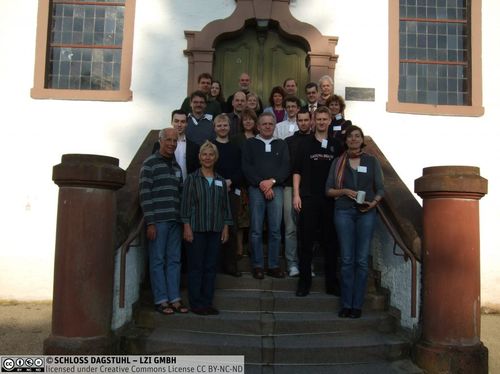Dagstuhl Perspectives Workshop 09142
Preventing the Brainware Crisis
( Mar 31 – Apr 03, 2009 )
Permalink
Organizers
- Stephan Diehl (Universität Trier, DE)
- Michael R. Fellows (Charles Darwin University - Darwin, AU)
- Werner Hartmann (infoSense, CH)
- Ulrike Stege (University of Victoria, CA)
Contact
Sponsors
Impacts
- Preventing the Brainware Crisis : Dagstuhl Manifesto : pp. 324 - 326 - Diehl, Stephan; Fellows, Michael R.; Hartmann, Werner; Stege, Ulrike - Heidelberg : Springer, 2010 - (Informatik Spektrum : 33. 2010, 3 : pp. 324 - 326).
- Reaching Out to the Media : Become a Computer Science Ambassador : article : pp. 113-116 - Rosamond, Frances A.; Bardohl, Roswitha; Diehl, Stephan; Geisler, Uwe; Bolduan, Gordon; Lessmöllmann, Annette; Schwill, Andreas; Stege, Ulrike - New York : ACM, 2010 - (Communications of the ACM : 54. 2011, 3 : pp. 113-116.
Schedule
Computer science (CS) and engineering research develops rapidly, and their successes influence economy and our daily life tremendously. CS has become an important part of other sciences, social sciences, arts, and engineering; a big part of research activities and jobs in CS are highly interdisciplinary.
From the 1960s until 2000, engineering and CS have been popular. No extra mile had to be taken to attract students to universities. While nowadays our youth is using new technologies fluently, the number of CS students in first-year university has declined alarmingly in North-America and Europe. Although according to some German statistics the number of graduating students increased from 2005 to 2006, enrollments have dropped 49% from their height in 2001/02. The number of female undergraduate students in CS is low. The alarming trend of declining enrollment exists despite a desperate need for computer scientists in industry and a popular debate on the topic in the media. Although the IT industry is booming and the job opportunities for its graduates are excellent, the public perception seems to reflect a contrary attitude.
The participants of the perspectives workshop included researchers from academia and industry, teachers, science journalists as well as employment officers. This allowed them to discuss from many different aspects the problem of how to prevent the brainware crisis, i.e. to stop the increasing lack of computer science students which will result in a massive shortage of computer science researchers and IT professionals in the long run.
In their manifesto the participants elaborate on their three main recommendations which can be briefly summarized as: make computer science programs more attractive to women, make curricula more engaging and interdisciplinary, and make the public more aware of the results and impact of computer science research.
- Wolfgang Back (Computer:club 2 - Köln, DE)
- Roswitha Bardohl (Schloss Dagstuhl, DE) [dblp]
- David Blades (University of Victoria, CA)
- Gordon Bolduan (Universität des Saarlandes, DE) [dblp]
- Torsten Brinda (Universität Erlangen-Nürnberg, DE) [dblp]
- Ingo Dahm (Deutsche Telekom - Bonn, DE)
- Stephan Diehl (Universität Trier, DE) [dblp]
- Michael R. Fellows (Charles Darwin University - Darwin, AU) [dblp]
- Uwe Geisler (Famity.de - Ober-Olm, DE)
- Philipp Hertel (University of Victoria, CA)
- Annette Leßmöllmann (Hochschule Darmstadt - Dieburg, DE)
- Roberta MacDonald (EMCS - Sooke, CA)
- Todd Milford (University of Victoria, CA)
- Peter Mirold (Universität des Saarlandes, DE)
- Benjamin Obermeier (Bundesagentur für Arbeit - Trier, DE)
- Wolfgang Pohl (BWINF - Bonn, DE) [dblp]
- Frances A. Rosamond (Charles Darwin University - Darwin, AU) [dblp]
- Karl Schoder (PH Niederösterreich - Baden, AT)
- Andreas Schwill (Universität Potsdam, DE)
- Ulrike Stege (University of Victoria, CA) [dblp]
- Eileen Van der Flier-Keller (University of Victoria, CA)
- Achim Wagner (Bundesagentur für Arbeit - Trier, DE)
- Christel Weins (LOS - Saarbrücken, DE)
Classification
- interdisciplinary
Keywords
- computer science education
- outreach
- people networking
- enrolment crisis
- schools



